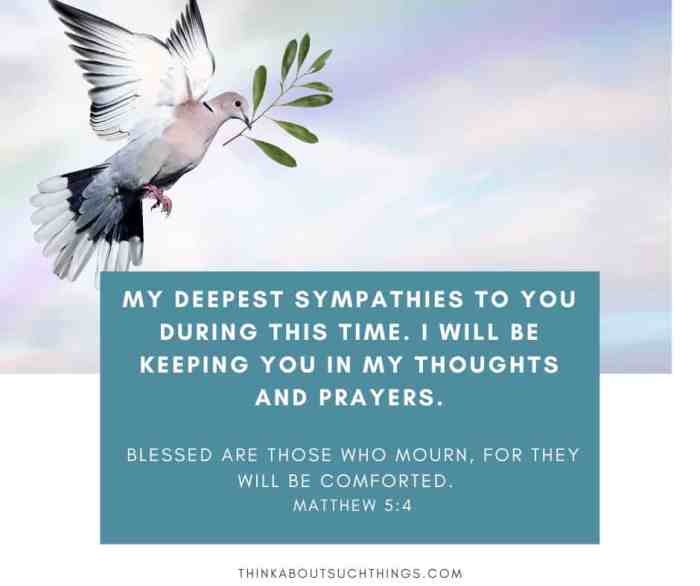In times of grief and loss, the Catholic faith offers a profound source of comfort and solace. Catholic condolences, rooted in the teachings and traditions of the Church, play a vital role in expressing sympathy, support, and spiritual guidance to those who have lost loved ones.
These messages serve as a testament to the power of faith in providing hope, strength, and healing during difficult times.
Beyond mere words of condolence, Catholic condolences offer a unique blend of spiritual support, prayers, and references to Scripture. They remind the bereaved of the eternal hope and promise of resurrection, emphasizing the belief in life beyond earthly existence. By drawing upon the wisdom and teachings of the Church, Catholic condolences help the grieving find meaning and purpose amidst their sorrow.
Definition and Significance of Catholic Condolences

In the face of grief and loss, Catholic condolences offer a unique expression of sympathy and support rooted in the teachings and beliefs of the Catholic faith. They serve as a powerful reminder of the eternal hope and comfort found in the resurrection of Jesus Christ.
For Catholics, death is seen as a passage from earthly life to eternal life with God. Catholic condolences acknowledge the pain and sorrow of loss while also offering hope and solace in the promise of everlasting life. This perspective provides a profound source of comfort and strength to those who are grieving the loss of a loved one.
The Role of the Catholic Faith in Providing Comfort and Solace
The Catholic faith offers a rich tapestry of beliefs, rituals, and traditions that provide comfort and solace to those who are grieving. These include:
- Belief in the Resurrection: The central tenet of the Catholic faith is the resurrection of Jesus Christ, which offers hope that death is not the end but a transition to eternal life.
- Prayer: Catholics believe in the power of prayer to bring comfort and strength to those who are grieving. They often pray for the deceased and for the bereaved, asking God to grant them peace and healing.
- Sacraments: The sacraments, particularly the Eucharist and the Sacrament of Reconciliation, provide spiritual nourishment and support to Catholics during times of grief. They offer opportunities for reflection, repentance, and renewal.
- Community Support: The Catholic community provides a network of support for those who are grieving. Parishes often offer bereavement groups, counseling services, and other resources to help people cope with their loss.
Common Elements of Catholic Condolence Messages
Catholic condolence messages are often characterized by their expressions of sympathy, prayers, and references to Scripture. They aim to provide comfort and support to the grieving family and friends, while also acknowledging the spiritual significance of death and the hope of eternal life.
Expressions of Sympathy
Catholic condolence messages typically begin with an expression of sympathy, such as:
- “Please accept my deepest condolences on the passing of your loved one.”
- “I am so sorry for your loss. My thoughts and prayers are with you during this difficult time.”
- “May God grant you strength and peace as you grieve the loss of your loved one.”
Prayers
Prayers are an important part of Catholic condolences. They are a way of asking God to comfort the grieving family and friends, and to grant the deceased eternal rest.
Common prayers include:
- The Lord’s Prayer
- The Hail Mary
- The Apostles’ Creed
- The Rosary
References to Scripture
Catholic condolence messages often include references to Scripture. These references can provide comfort and hope to the grieving family and friends, reminding them of God’s love and the promise of eternal life.
Common Scripture passages include:
- John 14:1-4: “Let not your hearts be troubled. Believe in God; believe also in me. In my Father’s house are many rooms. If it were not so, would I have told you that I go to prepare a place for you? And if I go and prepare a place for you, I will come again and will take you to myself, that where I am you may be also.”
- Revelation 21:4: “He will wipe away every tear from their eyes, and death shall be no more, neither shall there be mourning, nor crying, nor pain anymore, for the former things have passed away.”
- Romans 8:38-39: “For I am sure that neither death nor life, nor angels nor rulers, nor things present nor things to come, nor powers, nor height nor depth, nor anything else in all creation, will be able to separate us from the love of God in Christ Jesus our Lord.”
Personalizing Catholic Condolence Messages
In the realm of Catholic condolences, personalization is an art that elevates empathy and resonates with the bereaved. A well-crafted message, tailored to the unique bond shared between the deceased and the grieving, offers solace and comfort in times of profound sorrow.
Personalizing a Catholic condolence message requires a thoughtful approach, encompassing the following steps:
Gathering Information about the Deceased
- Seek Insights from Loved Ones: Engage in heartfelt conversations with family members, friends, or colleagues of the deceased to gather anecdotes, memories, and significant life events.
- Review Social Media: Explore the deceased’s social media presence to gain insights into their passions, interests, and cherished moments.
- Reflect on Personal Interactions: Recall your own encounters with the deceased, noting their unique qualities, acts of kindness, and shared experiences.
Expressing Genuine Empathy and Understanding
- Acknowledge the Depth of Loss: Express your heartfelt sorrow and acknowledge the profound impact of the loss on the bereaved.
- Offer Words of Comfort: Share uplifting messages from the Bible, prayers, or quotes that provide spiritual solace and strength.
- Validate the Grieving Process: Assure the bereaved that their emotions are valid and that grief is a natural response to loss.
- Offer Practical Support: Inquire about specific ways you can assist during this difficult time, such as offering meals, childcare, or simply lending a listening ear.
Offering Spiritual Support and Comfort
Catholic condolences are a powerful expression of spiritual support and comfort to the bereaved. They offer a unique perspective on death and grief, rooted in the belief in eternal life and the resurrection of the dead.
Catholic condolences often include prayers, Scripture passages, and quotes from saints or spiritual leaders that can provide solace and hope to those who are grieving.
Prayers
Prayers are a central part of Catholic condolences. They offer a way for the bereaved to connect with God and to find comfort in the knowledge that they are not alone in their grief.
- The Lord’s Prayer is a common prayer that is often included in Catholic condolences.
- The Hail Mary is another popular prayer that can be used to express sympathy and support.
- The Prayer for the Dead is a specific prayer that is offered for the repose of the soul of the deceased.
Scripture Passages
Scripture passages can also be a source of comfort and hope for the bereaved. They offer a reminder of God’s love and mercy, and they can help to put death in a larger perspective.
- John 14:1-4 is a passage that speaks to the promise of eternal life.
- Romans 8:35-39 is a passage that speaks to the power of God’s love.
- Revelation 21:4 is a passage that speaks to the hope of a new heaven and a new earth.
Quotes from Saints or Spiritual Leaders
Quotes from saints or spiritual leaders can also be a source of inspiration and comfort for the bereaved.
- “Death is not the end, but a new beginning.”
– Saint Francis of Assisi - “God is our refuge and strength, a very present help in trouble.”
– Psalm 46:1 - “We are confident, I say, and willing rather to be absent from the body, and to be present with the Lord.”
– 2 Corinthians 5:8
How Catholic Condolences Can Help the Bereaved Find Hope and Strength in Their Faith
Catholic condolences can help the bereaved find hope and strength in their faith in several ways.
- They can remind the bereaved of the promise of eternal life and the resurrection of the dead.
- They can offer a sense of community and support during a difficult time.
- They can help the bereaved to process their grief and to come to terms with their loss.
Catholic condolences are a powerful expression of faith and love. They can offer comfort and support to the bereaved during a difficult time, and they can help them to find hope and strength in their faith.
Etiquette and Timing of Catholic Condolence Messages
Catholic condolence messages should be sent in a timely and respectful manner, taking into consideration the privacy and wishes of the bereaved. Here are some guidelines to follow:
Timing of Condolence Messages
- Promptness: Sending condolences as soon as possible after learning of the death is considered appropriate. However, it is important to be mindful of the family’s immediate needs and allow them some time to grieve privately before reaching out.
- Consider Cultural and Religious Customs: Be aware of any cultural or religious customs that may influence the timing of condolences. For example, in some cultures, it is customary to wait a specific period of time before sending condolences.
Methods of Delivery
- Personal Visit: If possible, a personal visit is the most meaningful way to offer condolences. This allows you to express your sympathy in person and provide comfort and support to the bereaved.
- Written Note or Card: If a personal visit is not possible, sending a written note or card is a thoughtful gesture. Choose a card that expresses your sympathy and includes a personal message.
- Phone Call: A phone call can be an effective way to offer condolences, especially if you live far away or have difficulty traveling. Keep the conversation brief and focus on expressing your sympathy and offering support.
- Email or Social Media: While email and social media are convenient ways to communicate, they are generally not considered appropriate for sending condolences. However, they can be used to express sympathy to someone you may not know well or if you are unable to reach them through other means.
Respecting Privacy and Wishes
- Be Respectful of the Family’s Wishes: Some families may prefer to grieve privately and may not want to receive condolences. Respect their wishes and avoid contacting them if they have requested privacy.
- Be Sensitive to Cultural and Religious Beliefs: Be aware of the cultural and religious beliefs of the bereaved family. Some cultures have specific customs and rituals surrounding death and mourning, and it is important to respect these traditions.
Responding to Catholic Condolence Messages
- Express Gratitude: When you receive a condolence message, take the time to express your gratitude to the sender. This can be done in person, through a written note, or over the phone.
- Acknowledge the Loss: In your response, acknowledge the loss of the loved one and express your sympathy. You can also share a fond memory or anecdote about the deceased.
- Offer Support: Let the sender know that you are there to support them during this difficult time. Offer practical assistance, such as helping with funeral arrangements or providing meals, or simply offer your presence and companionship.
Examples of Catholic Condolence Messages

Catholic condolence messages are a meaningful way to offer comfort and support to grieving families. They can be adapted to various situations and relationships, expressing sympathy and offering spiritual guidance.
The following are examples of Catholic condolence messages organized by the relationship between the deceased and the bereaved:
Loss of a Parent
- May the memories of your beloved parent bring you comfort during this difficult time. Their love and guidance will forever be a part of you. May God grant you strength and peace as you navigate this journey of grief.
- As you mourn the loss of your parent, remember the eternal bond you shared. Their love and presence will continue to live within your heart. May God’s grace bring you solace and hope in the days ahead.
- In the passing of your parent, may you find strength in the love and support of your family and friends. Know that your parent is now in God’s loving embrace, and their memory will always be cherished.
Loss of a Spouse
- Your spouse was a beacon of love and devotion, and their memory will forever be etched in your heart. May God’s love and grace sustain you during this time of sorrow.
- As you grieve the loss of your beloved spouse, remember the beautiful journey you shared together. May the memories of their love and companionship bring you comfort and peace.
- In the passing of your spouse, may you find solace in the knowledge that their soul is now in God’s eternal care. May you find strength and healing in the love and support of those who cherish you.
Loss of a Child
- The loss of a child is an unimaginable pain, and words cannot express the depth of your grief. May God’s love and compassion embrace you during this difficult time.
- Your child’s life was a precious gift, and their memory will forever be a part of your heart. May you find comfort in knowing that they are now in God’s loving care.
- As you navigate the journey of grief, remember that you are not alone. May God’s grace and the love of your family and friends bring you strength and healing.
Loss of a Friend
- Your friend was a true blessing in your life, and their absence will be deeply felt. May God grant you peace and comfort as you grieve the loss of this cherished friendship.
- In the passing of your friend, may you find solace in the memories of the joy and laughter you shared together. May God’s love sustain you during this time of sorrow.
- As you mourn the loss of your friend, remember that their spirit will always be with you. May God’s grace and the love of your community bring you strength and healing.
Final Thoughts

In essence, Catholic condolences are more than just expressions of sympathy; they are beacons of faith, hope, and spiritual guidance. They serve as a reminder that even in the face of loss, the love and mercy of God endure, providing solace and strength to those who mourn.
As the bereaved navigate their journey through grief, Catholic condolences offer a comforting embrace, reminding them that they are not alone and that their faith can be a source of unwavering support.
Questions and Answers
What are the key elements of a Catholic condolence message?
Common elements include expressions of sympathy, prayers, and references to Scripture. Phrases like “May God grant you peace and comfort” or “Eternal rest grant unto him, O Lord” are often used.
How can I personalize a Catholic condolence message?
Gather information about the deceased’s life, interests, and relationship with the bereaved. Use this information to craft a message that reflects their unique bond and provides genuine empathy and understanding.
What is the role of spiritual support in Catholic condolences?
Catholic condolences offer spiritual support through prayers, Scripture passages, and quotes from saints or spiritual leaders. These elements help the bereaved find hope, strength, and comfort in their faith during times of grief.
What is the proper etiquette for sending Catholic condolence messages?
Send condolences promptly, respecting the privacy and wishes of the bereaved. Choose an appropriate method of delivery, such as a handwritten note, email, or phone call. Respond to Catholic condolence messages with gratitude and appreciation.